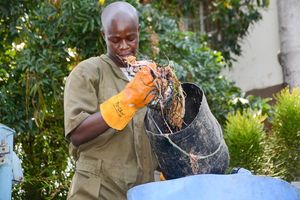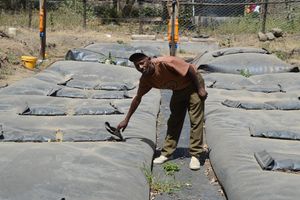
Obedi Kimani and his son David mix cow dung with water before taking the mixture to a digester.
After walking for a few kilometres from Elburgon, we arrive at Mr Obedi Kimani’s home in Turi. When he retired from teaching in 1992, Kimani, 92, continued with farming.
“I have been attending agricultural fairs for many years. There was a time I came across a biogas digester. On returning home, I told my son who also showed interest,” he says.
“Days later, a group from the World Bank that was visiting farmers came and installed a biogas digester here but it did not work.”
His son, David, later went for training on installing biogas kits.
After consultations, David and his father agreed to have biogas chamber on the farm. By then, the elderly man had six cows, which would produce enough dung to sustain the biogas project. The biogas helped reduce the buying of LPG for domestic use.
“The team came to install the biogas for Sh100,000. We made a Sh50,000 downpayment. They used an imported tube and a special black ‘blanket’ that prevents rodents from destroying the tube holding the gas,” says David, adding that the area of the biogas tube measures 4ft by 12ft.
He adds that the gas was ready for use a month after installation of the kit. Everything has been running smoothly since, with the family now having 10 cows.
“We use biogas for domestic purposes, especially cooking and heating. Some of the dung is used as organic fertiliser,” David says.
The gas is in plenty during dry periods but reduces when cold hits Elburgon.
“When one stops adding dung to the biogas chamber, the gas reduces,” David says.
David and his father collect fresh dung from the cowshed every morning. The family practises zero-grazing.
The dung is heaped in one area and collected on a wheelbarrow two or three days later. It is then taken to a container near the biogas chamber, where foreign matter is removed using hands or a rake.
“I mix the dung and water in the chamber then stir. This ensures the sieved mixture passes through the waste pipe to the sistema tube,” David says.
He adds that when the tube was installed, he and his father waited for a month for the gas to be ready for use.
Kimani and his son say the decision to start the project was well thought out.
“We no longer buy LPG, cylinders or bags of charcoal whose prices have also increased in the last few months,” Kimani says.
He plans to get a bigger sistema tube that can be used to power the chaff-cutter and other machines. That will minimise manual work as Kimani’s herd increases. The extension will also light his home.
Kimani urges livestock farmers to embrace biogas for domestic use. He says it also eliminates the use of chemical fertiliser on farms.
According to Kimani, a farmer with two or three cows can have a biogas chamber.
“Farmers and students visit my farm for benchmarking almost daily. The students include those pursuing degrees in agriculture and agro-ecology. I am engaged in mixed farming,” the nonagenarian says.
“For more skills, I attend seminars, shows, read newspapers and do research on YouTube.”
Without giving details, he says his farming enterprise has expanded from the time he retired as a primary school teacher.
David visualises using locally available materials to install biogas chambers for farmers in future.
“I hope to be the leading biogas producer in Elburgon and create jobs by installing the chambers at a fee. My target is those with livestock,” he says.
Edwin Kimtai, a trainer at Baraka Agricultural College in Molo, urges farmers to go for biogas as it is a sustainable way of managing organic waste while generating energy.
He says animal droppings, crop residue and other organic materials can be used in aerobic digesters to produce biogas for heating, cooking and lighting.
“It reduces greenhouse gas emissions and creates nutrient-rich materials that can be used as fertiliser. It improves soil health and crop harvests,” he says, adding that investing in biogas can enhance energy independence, reduce waste disposal costs and contribute to sustainable agriculture.









